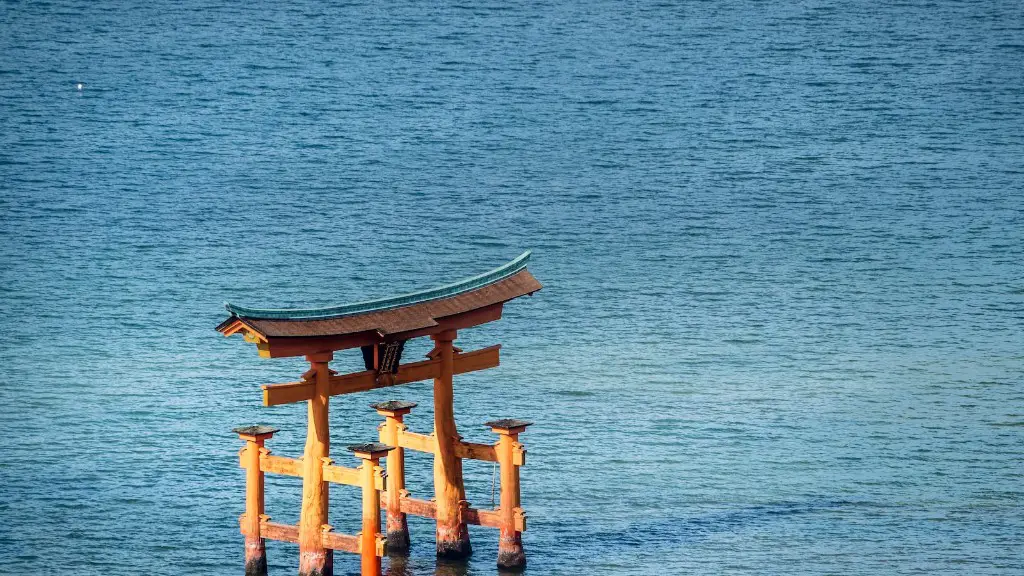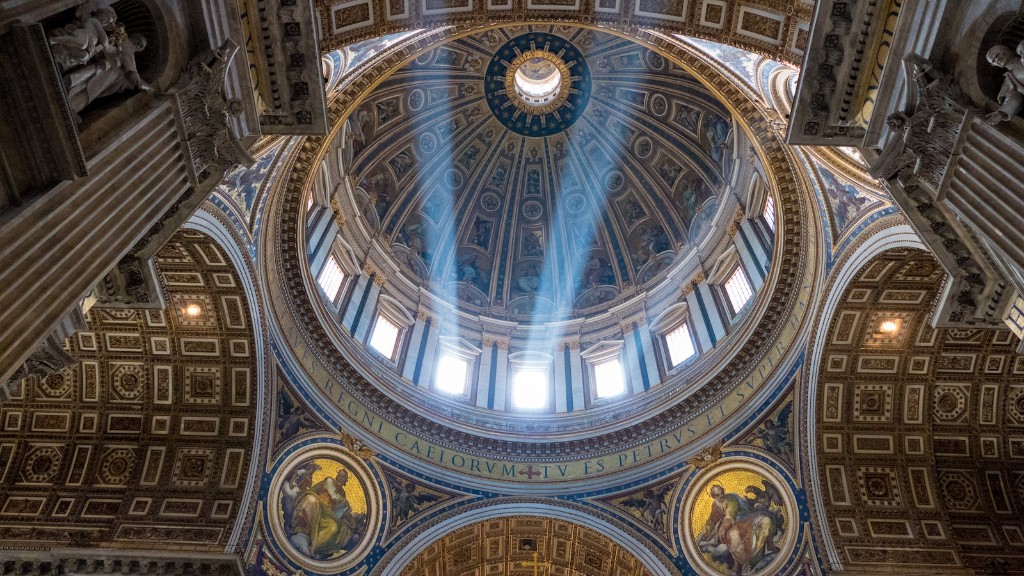Hinduism is a polytheistic faith, meaning that it has multiple gods. But just how many gods are there in Hinduism? This article will provide readers with information about the many gods in Hinduism, and will allow readers to gain an understanding of this ancient religion. Specifically, this article will cover various aspects of Hindu gods, including their roles, their origin stories, and how they are worshipped today.
According to Hindu belief, the gods in the pantheon are actually varied forms of the same divine power. These gods represent various qualities and aspects of the divine, such as wisdom, strength, courage, and so forth. There is no one definitive number for how many gods are found within Hinduism, as the pantheon is ever-expanding. Nonetheless, some estimates claim there to be over three hundred million gods in the pantheon.
The gods are often symbolized as having human forms and stories, which have been told for thousands of years. These stories help to explain the births and roles of each god and goddess in the pantheon. While the origin stories for each god vary, most tales revolve around the gods overcoming evil forces or natural disasters. In addition, some stories tell of the gods taking part in a great battle, or facing off against demons or giants. Although these tales are rife with mythology and fantasy, they serve as reminders of how these gods overcame the challenges of life.
The most prominent gods in the Hindu pantheon are considered to be Vishnu, Brahma, and Shiva. These three gods represent the three primary aspects of the divine—creation, preservation, and destruction, respectively. Other gods in the pantheon may not be as widely known, but are nonetheless important, especially to members of different local or regional Hindu sects. These lesser-known gods may serve as guardians of rivers, forests, and animals, or as bringers of prosperity, peace, and fertility.
Today, Hindus will traditionally pray to the gods for blessings, guidance, and protection. Different gods are typically associated with certain aspects of life and can be prayed to for different purposes. Some gods may be invoked for healing, for instance, and others may be prayed to for success in business. This practice of praying to the gods is known as puja and is an integral part of Hinduism.
The gods in Hinduism may appear to be numerous and overwhelming to outsiders, but they all come together to tell a unified story, just as the myths and rituals of this ancient faith do. Understanding the many gods in Hinduism can be daunting, but it helps to remember that they all represent various aspects of the same divine power.
Goddesses in Hinduism
In Hinduism, there are also numerous goddesses in the pantheon. These deities were believed to be divine forces who embodied aspects of the female divine. The most prominent goddesses are Saraswati, Lakshmi, and Parvati. Traditionally, these goddesses are symbolic of knowledge, wealth, and auspiciousness respectively. They have been venerated by Hindus for centuries and are seen as representing different aspects of the divine female.
Goddesses in the Hindu pantheon, like the gods, often have stories associated with them. These stories can explain the origins of the goddess, or how she is associated with certain aspects of life. In addition, like with the gods, goddesses are also venerated and prayed to for blessings and protection. The practice of praying to goddesses is known as puja and can take various forms, including offerings and gestures of respect.
The goddesses in Hinduism are often seen as representatives of the divine feminine. They are symbolic of the power of the feminine divine and the importance of honoring the goddess in Hinduism. Through the veneration of these goddesses, worshippers not only honor the divine feminine, but they also strive to embody its qualities as well.
Jyotirlingas- The manifestation of Shiva
Jyotirlingas are considered to be the manifestation of Shiva, the god of destruction in Hinduism. It is believed that these 12 jyotirlingas scattered across India are the physical manifestations of Shiva and are sacred sites for worship. These sites are believed to have been consecrated by Lord Shiva himself in his various incarnations and have been venerated for centuries.
The jyotirlingas are seen as symbolic of Shiva and as such have become immensely popular pilgrimage sites. These sites draw thousands of pilgrims every year, many of whom will make the long and difficult journey in order to visit the jyotirlingas. They not only pay homage to Lord Shiva, but are also seen as re-enacting a mythical journey or ritual associated with Shiva.
Jyotirlingas are believed to be some of the most powerful sites of worship in Hinduism. The faithful believe that if they are able to make a pilgrimage to one or more of these sites, they will be blessed with divine grace, spiritual wisdom, and other blessings from Shiva. As such, the jyotirlingas have become an important symbol of devotion and reverence for Hindus.
Hindu Festivals
Hindus celebrate a number of religious festivals throughout the year in order to honor the gods of the pantheon. These festivals typically involve a combination of prayer, music, dance, and various traditional rituals. Additionally, feasts and offerings are typically made in order to please the gods and receive their blessings.
The most important religious festivals typically involve a celebration of a particular god or goddess. For instance, Diwali is a festival that celebrates the victory of good over evil, with particular focus on Lord Vishnu and his consort Lakshmi. Similarly, during Holi, God Krishna is worshipped and honored, while many Hindus will make pilgrimages to sacred sites associated with shiva during Maha Shivratri. Other festivals are more general in nature, such as Navratri, which celebrates the feminine divine in general, and Guru Purnima, which is a celebration of wisdom and knowledge.
These festivals represent an opportunity for Hindus to come together in celebration, as well as to honor and venerate the many gods in the pantheon. Through prayer, offerings, and other acts of devotion, Hindus reaffirm their faith in the divine and seek the exchange of spiritual blessings from the gods.
Rituals and Practices
Besides praying, offering, and worshiping the gods, there are also various rituals and practices that are associated with Hinduism. These include rituals of purification and cleansing, as well as rituals of initiation and dedication. Additionally, there are also rituals that honor deceased family members, as well as rituals that are meant to bring positive energy, good luck, and prosperity.
Rituals in Hinduism are important, as they provide a space to connect spiritually with the gods, as well as a physical space in which to do so. Hindus believe that rituals have the power to bring about spiritual blessings and protection from the gods. Additionally, through rituals, worshippers can engage in physical acts of devotion, such as bathing in holy waters, offering food, burning incense, and so forth.
These rituals, along with puja and prayer, help to give faith and meaning to worshippers. They are a tangible way for Hindus to connect with the divine, as well as a way to experience the power of the gods in a physical and tangible way.
Symbols of Hinduism
Symbols are often used throughout Hinduism to represent the various gods, goddesses, and beliefs of the faith. The most prominent symbol is the Om symbol, which is a universal symbol representing the divine. It is often used in ritual chants and meditation practices. In addition, symbols are also used to represent individual gods and goddesses, such as the trident for Shiva, the conch shell for Vishnu, and the lotus for Saraswati.
Symbols in Hinduism can be found in art, architecture, and other objects. They are often used as a way for Hindus to connect with the divine, and to remember the gods that fill the pantheon. Furthermore, these symbols can be seen as reminders of the divine power that is present in the universe and all living things.
Each symbol has its own significance, and Hindus will often put their faith in the symbols as a way of focusing their spiritual practice. Through symbols such as the trident, conch shell, and lotus, Hindus can focus their prayers and offerings to the gods, as well as remember the power of the divine that lies within.
Journey and Purpose of Life
Hinduism is a religion that emphasizes the journey of life, as well as one’s purpose and ultimate destination. Followers of Hinduism strive to carve out a meaningful path in life, as well as to pursue a greater understanding of the divine. The gods in Hinduism represent various aspects of the divine, and it is up to followers of the faith to determine how to balance and incorporate these into their day-to-day life.
The journey of the follower of Hinduism is one of discovery, learning, and ultimately, union with the divine. Hindus believe that it is up to each individual to seek out their own spiritual truth, as well as to make the most of their lives through service, prayer, and other acts of devotion. The many gods in the Hindu pantheon serve as reminders of the power of the divine, and of the need to strive for a greater purpose in life.
Through an understanding of the many gods in Hinduism, as well as an understanding of the rituals and practices associated with them, Hindus can strive to come closer to the divine. Ultimately, it is up to the individual to decide how to pursue this path, as well as to determine what the purpose of life is for them.



